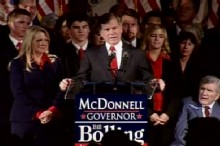The Extraordinary Measures Needed to Kill the Bill — Updated with Vote Numbers
The corruption of using the public treasury as a check book to buy the votes of Senator Nelson and Senator Sanders — in the face not only overwhelming public opposition, but also in the face of a public that now wants Congress to do nothing on health care — means that extraordinary measures are needed to kill ObamaCare.
This plan, if executed properly, will kill the bill and it will give opponents two more bites at the apple, after it passes the Senate.
There are some atmospheric conditions that will help this plan work. For example, both sides of the net roots should cease fire on posts against each other. There must be a truce until the bill is dead. The target is the bill, not each other.
So, for those on the left who have decided to kill this bill, they are welcome to join in this the kill-the-bill fun.
Rationale: There are many reasons in agreement between the right and the left and the American public about why this bill must be killed:
1. It will increase health care costs;
2. The individual mandate is massive government intrusion on individual freedom, and is a gift to the private insurers, and disproportionately impacts lower-income families;
3. The fantasies of CBO’s assumptions notwithstanding, this bill will accelerate our march to financial insolvency; and,
4. Passage of the bill merely reinforces the practice of buying votes with debt issued by the U.S. Treasury;
5. Among many other reasons, in the words of Howard Dean, the bill does more harm than good.
The Plan: First, conservatives will object to the appointment of the conferees. This is not a motion, so it is non-debatable. An objection cannot be overcome unless the Senator making the objection caves. Let’s hope Senator McConnell agrees with this approach — but regardless, the objection shall be made.
This forces two votes in the U.S. House, one vote to amend the Senate bill on the House floor, since the Senate bill likely cannot pass the House unamended, and will force another vote on final passage of the amended House bill.
So, first, conservatives force two votes in the House, by preventing the appointment of the conferees, and therefore, preventing a House-Senate Conference.
Second, the left will focus on three separate issues to kill the bill in the House. The object of these issues is not to support these policies per say, but to add items to the House bill that will be so objectionable that when the bill goes back over to the Senate, that the Dems lose one or more of their 60 votes.
The Public Option: The progressive’s net roots should hold accountable the Democratic House members who said they would not vote for the bill if there was no public option. Progressives need to produce enough votes to force the public option back into the bill. Forcing the public option back into the bill is in the progressive’s interest since it will show they have the political power to do it, and will set a precedent for a new health care reform baseline in the House for Democrats. It is in conservative’s interest for this to happen because if it does, Senator Lieberman’s vote reverts to a NO.
The Nelson Buy-Off: Both the left and the right net roots will focus on pulling the Nebraska and Vermont free pass on increased Medicaid spending, on the basis that it is a corrupt back room deal that may be unconstitutional on the basis that it violates the equal protection clause (the 14th amendment to the Constitution.)
Unions: Unions must pull the Senate tax on Cadillac health plans, and replace it with the House tax on individuals. (I know, I can’t believe I just wrote that either!) This will force Senators, when the bill goes back to the Senate, to oppose the bill which could force the Dems lower than 60 votes.
Hold the No Votes: Conservatives need to hold and add one or two more no votes to the 39 House votes against the bill, among those Democrats who have concerns about their own re-election or who have announced their retirement — since the leverage from the Speaker has substantially decreased. If every No vote on the original House bill holds, there only needs to be two additional no votes.
Pro-Life and Pro-Abortion Forces: In short, have at it. Given the Stupak amendment majority in the House, the pro-lifers must stick Stupak back on the bill, so that when it is sent back to the Senate, the pro-abortion majority can pull Stupak back off. When the bill goes back to the Senate, the pro-abortion forces can remove Stupak, just as they did a couple of weeks ago. Once Stupak is pulled again from the Senate it must go back to the House to be amended, or die there.
I am willing to coordinate these actions with the left in real-time, and work with the Progressives who want to kill the bill — to share intelligence and whip counts. This way the left and the right working together will accomplish not only what we want, but what the American people want.
Oh, I did not mention this in the original post, but should have:
we do not need any more than 42 votes on the House floor, and last time there were 39 No votes.
Assuming we have a hard base of 25 no Dem votes, then the net roots need to produce eight House votes on either the abortion or public option question.
The Stupak folks ought to be able produce ten additional no votes.
This is not difficult math. And MoveOn.org is already telling its members to oppose the Senate bill







